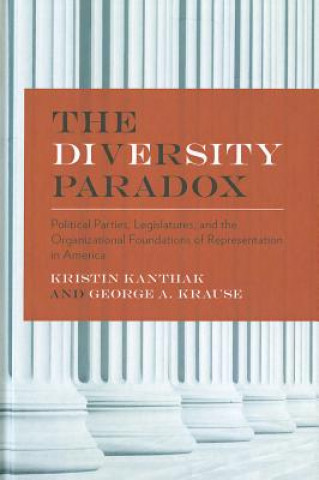
Doručení
Nákupní rádce





Nehodí se? Vůbec nevadí! U nás můžete do 30 dní vrátit
 Dárkový poukaz
V libovolné hodnotě
Dárkový poukaz
V libovolné hodnotě
S dárkovým poukazem nešlápnete vedle. Obdarovaný si za dárkový poukaz může vybrat cokoliv z naší nabídky.
Diversity Paradox
 Angličtina
Angličtina
 415 b
415 b
30 dní na vrácení zboží
Mohlo by vás také zajímat


Majority-minority group relations are central to the proper functioning of any organization, but these relationships are especially important in democratically-elected legislatures. In legislatures, for example, group dynamics affect how the legislature operates, who is valued enough to play a critical decision-making role, and what voices matter in determining policy outcomes. In The Diversity Paradox, George Krause and Kristin Kanthak explore the nature of these relationships, particularly their effect on both the valuation of minority group legislators and the ideological stability of the legislature in general. Interestingly, they demonstrate that an increase in a minority group's size within a legislature actually leads to the devaluation of individual minority group members. They call this the 'diversity paradox': In fact, representative institutions such as legislatures face a 'diversity paradox': when the size of a minority group increases beyond mere 'tokenism' in representative institutions such as legislatures, it tends to create an unintended backlash toward the minority group's members that emanates from both majority and fellow minority group members. Representative institutions, therefore, can only fulfill the promise of adequate representation of minority group interests only by conquering this paradox. They can accomplish this through jointly attaining sufficient 'numbers' and overcoming the coordination problems those numbers create. This is no small task and no small issue: the inclusion of minority group voices in representative institutions is critical in a wide range of political decisions, ranging from legislative gender quotas in the new Iraqi constitution to attempts in the U.S. to increase minority representation through redistricting. The question of whether or not an increase in descriptive representation (numbers) has an impact on substantive representation (policy) is central to such efforts, and therefore The Diversity Paradox has important ramifications for all students interested in democratic representation.
Informace o knize
 Angličtina
Angličtina




 Jak nakupovat
Jak nakupovat























